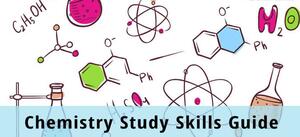Date
02/03/20
By Alayna Johnson, 2019-2020 SCS Student Advising Leader:
As you progress in the chemistry or chemical engineering curriculum, you’ll begin to move on to more advanced courses. While many of the study techniques you picked up during your introductory classes are still applicable, there are a few differences you’ll want to keep in mind as you move to 300- and 400- level lecture courses.
- Less busy work. Many of the general and organic chemistry courses have homework due several times a week. In upper-level courses, it’s much more common to have only a single problem set due every week. This is a welcomed change for many but comes with a few caveats. For one, you can obviously expect these problem sets to be more challenging than your homework in introductory chemistry courses. If you score poorly on an assignment (or forget to turn it in!), it’ll impact your grade more heavily. It also may mean that you’ll have fewer problems to study from come exam time. On the flip side, you’ll have more time to work carefully on the problems and attend office hours. This is all to say that while the quantity of your homework may decrease, the quality should increase.
- Lectures matter more. Some freshman-level courses heavily mirror the textbook, so you might get away with skipping a few lectures. In upper-level courses, it’s likely that the text will be used to supplement the lectures, not replace them. It’s not uncommon for the professor to introduce a concept that will be on the exam but isn’t found in the textbook. Thus, it’s important to attend a lecture, even if attendance points aren’t awarded.
- Class sizes decrease. Courses during the first few semesters of any SCS major tend to be large, but class size will begin to decrease in your sophomore and junior years. For instance, I’ve noticed that course sizes get considerably smaller after CHEM 420, when the chemistry and chemical engineering majors diverge. This might mean you have fewer classes with your friends, but it also gives you an opportunity to get to know your other classmates. Generally, the students who successfully progress to the advanced courses are quite intelligent and hardworking, so be prepared for a more competitive curve.
- Fewer multiple-choice assessments. Because of the size of many introductory courses, instructors often have no choice but to administer multiple-choice exams. As class sizes get smaller (see above), professors are able to assess your knowledge in more rigorous ways, like with free-response and problem-solving questions. Some students prefer these types of exams. Others need extra practice with free-response questions. If this is you, consider re-doing your problem sets and solving practice exams under timed conditions.
- Expectations increase. Once you pass the “weed out” courses and reach 300- and 400- level classes, professors will likely expect more than they would out of a first-year student. They might be less likely to excuse absences or accept late homework. On the flip side, with smaller class size, you can get more individualized attention and build a positive connection with your professor. Use this to your advantage.
